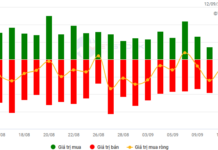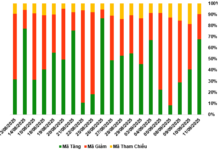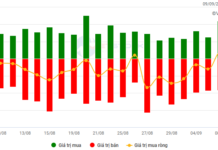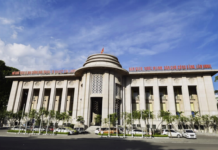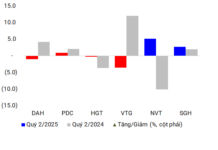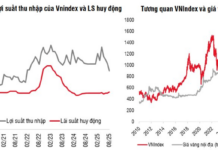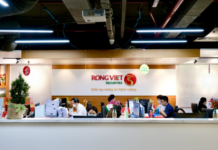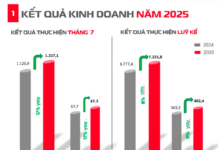Housing Conundrum in Ho Chi Minh City: Exploring Solutions
Mr. Huynh Thanh Khiet, Deputy Director of the Ho Chi Minh City Department of Construction, revealed the challenges in transitioning from resettlement housing to social housing. As a result, the city plans to auction off nearly 5,000 resettlement apartments.
Awaiting Finalization
On a plot of land spanning over 30 hectares, the Vinh Loc B Resettlement Area in Binh Chanh District was constructed over a decade ago at a cost of more than VND 1,000 billion. It comprises over 500 resettlement plots and 45 apartment blocks, totaling nearly 2,000 apartments. However, only about half of the apartment blocks are occupied, and even then, they are not at full capacity. The remaining 20-plus vacant lots have fallen into disrepair.
In previous years, the Binh Chanh District Public Service Company incurred significant expenses, amounting to VND 5-6 billion, for the management, operation, and maintenance of the area. Nonetheless, this task proved challenging as there were times when the company had to use its own funds and await reimbursement from the city.
As per the decision of the Ho Chi Minh City People’s Committee, in 2023, the vacant lots in the Vinh Loc B Resettlement Area were handed over to the Center for Housing and Construction Supervision under the Department of Construction.
Similarly, thousands of resettlement apartments in the 38.4-hectare area of An Khanh Ward, Thu Duc City, are part of a program to build 12,500 resettlement apartments for residents relocated from the Thu Thiem New Urban Area. Despite being located in a desirable location, these apartments have remained largely unoccupied for years and have fallen into a state of disrepair. The Center for Housing and Construction Supervision has taken over their management, as directed by the city.
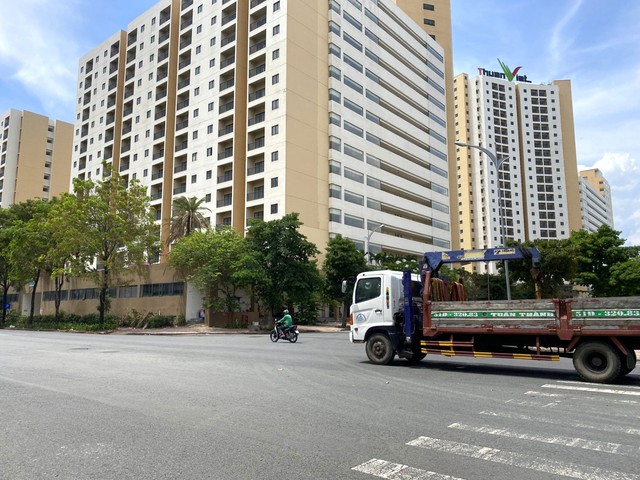
Thousands of resettlement apartments in Thu Duc City, part of the program to build 12,500 resettlement apartments for residents relocated from the Thu Thiem New Urban Area. Photo: QUOC ANH
In addition to these concentrated resettlement areas, the city also has a large number of resettlement apartments within residential projects that incur significant annual management and operation costs.
According to the Ho Chi Minh City Department of Construction, the city currently has nearly 9,000 state-owned resettlement apartments that have not yet been allocated to residents across 85 apartment blocks/clusters. Out of these, 39 apartment projects have official documents or notifications (from the management board, management company, or Public Service Company) requesting the settlement of management and operation costs for vacant apartments managed by the center, totaling more than VND 81 billion. The center has reported to the Department of Construction, recommending that the Ho Chi Minh City People’s Committee authorize the necessary procedures for the settlement of these costs.
Challenges in Changing the Purpose of Use
Concerned about the situation of thousands of vacant resettlement apartments, Ms. To Thi Bich Chau, Vice Chairman of the Vietnam Fatherland Front Central Committee and a deputy of the Ho Chi Minh City delegation to the National Assembly, raised the issue of managing resettlement housing in the city ahead of the 7th session of the National Assembly.
Many experts and organizations have suggested converting resettlement housing, which is currently in a state of “waiting for occupants,” into social housing to meet the significant demand of the people and prevent the waste of resettlement housing resources.
Mr. Huynh Thanh Khiet stated that the city has over 11,000 apartments and land plots, including nearly 9,000 apartments and over 2,000 land plots, that were established with government funds and are currently vacant. One group of apartments is intended for auction, while another group is designated for resettlement for 258 public investment projects in the city.
The city plans to auction off 4,927 apartments, including 3,790 apartments in the Thu Thiem Resettlement Area in Thu Duc City and nearly 1,000 apartments in Vinh Loc B. These projects were funded by the state budget and bank loans.
Mr. Khiet also provided a clear analysis of the challenges in converting resettlement housing into social housing. He explained that the regulations regarding social housing are stringent. Social housing is exempt from land use fees, which means that the cost of land use is not included in the selling price. On the other hand, social housing must include all costs (including compensation costs), resulting in a higher selling price.
Additionally, social housing is restricted to a size of under 70 square meters, so only about 30% of the 3,790 apartments meet this requirement. Furthermore, management must be done for the entire apartment building, rather than separating social housing from resettlement housing within the same building.
The Need for Smaller Auction Packages
According to experts, the city previously attempted to auction off 3,790 apartments in Thu Thiem but failed. Therefore, this time, it is crucial to thoroughly prepare the legal procedures and create attractive conditions for a successful auction. Many suggest that the auction should be divided into smaller packages to make it easier for businesses to participate and ensure the availability of financial resources.
Mr. Nguyen Quoc Bao, Chairman of the Ho Chi Minh City Real Estate Club, opined that the 3,790 resettlement apartments in the 38.4-hectare area have deteriorated significantly, which would result in a low auction price. Nonetheless, he believes that the city should persist with this approach.
Mr. Bao suggested that converting the resettlement housing into commercial housing for auction would increase the chances of success. However, to facilitate the participation of auctionees, the city should provide support in terms of policies and permits. Additionally, a suitable price should be set to ensure that the city collects revenue while also allowing investors to make a profit. If the situation of vacant resettlement apartments persists, it will not only lead to further deterioration but also incur additional management costs for the city…
Economist Dr. Dinh The Hien suggested that significant renovation costs are required to bring the resettlement apartments up to commercial housing standards. He recommended that the city divide the auction packages into smaller lots, which would be more feasible. Additionally, the city could allow businesses to pay in installments, collecting payments multiple times with interest calculated at bank rates. If the plan is not well-designed, the auction may not be successful.
Addressing a Series of Procedures
Regarding the plan to auction off land lots and 3,790 apartments in the Thu Thiem New Urban Area, in a report to the Ho Chi Minh City Party Committee, Mr. Phan Van Mai, Secretary of the Party Committee and Chairman of the Ho Chi Minh City People’s Committee, clarified that the assets to be auctioned were created with state budget funds. To ensure compliance with regulations and authority in terms of auctioning off public assets, the Ho Chi Minh City People’s Committee has directed relevant departments and units to continue providing consultations and proposing legal procedures. Therefore, time is needed to complete the relevant legal procedures before conducting the auction.
The Ho Chi Minh City People’s Committee has instructed the relevant units to provide consultations and proposals regarding the conversion from resettlement housing to commercial housing, the establishment of public ownership over common areas such as corridors, staircases, passageways, and parks, and the submission of reports to the Ho Chi Minh City People’s Committee for the establishment of public ownership over public assets to be auctioned.

